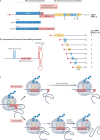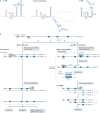Structures and functions of coronavirus replication-transcription complexes and their relevance for SARS-CoV-2 drug design
- PMID: 34824452
- PMCID: PMC8613731
- DOI: 10.1038/s41580-021-00432-z
Structures and functions of coronavirus replication-transcription complexes and their relevance for SARS-CoV-2 drug design
Abstract
Severe acute respiratory syndrome coronavirus 2 (SARS-CoV-2) has killed millions of people and continues to cause massive global upheaval. Coronaviruses are positive-strand RNA viruses with an unusually large genome of ~30 kb. They express an RNA-dependent RNA polymerase and a cohort of other replication enzymes and supporting factors to transcribe and replicate their genomes. The proteins performing these essential processes are prime antiviral drug targets, but drug discovery is hindered by our incomplete understanding of coronavirus RNA synthesis and processing. In infected cells, the RNA-dependent RNA polymerase must coordinate with other viral and host factors to produce both viral mRNAs and new genomes. Recent research aiming to decipher and contextualize the structures, functions and interplay of the subunits of the SARS-CoV-2 replication and transcription complex proteins has burgeoned. In this Review, we discuss recent advancements in our understanding of the molecular basis and complexity of the coronavirus RNA-synthesizing machinery. Specifically, we outline the mechanisms and regulation of RNA translation, replication and transcription. We also discuss the composition of the replication and transcription complexes and their suitability as targets for antiviral therapy.
© 2021. Springer Nature Limited.
Conflict of interest statement
E.A.C has received funding from Gilead Sciences to fund research on remdesivir’s incorporation into the RNA-dependent RNA polymerase. The other authors declare no competing interests.
Figures






Similar articles
-
Insights into RNA synthesis, capping, and proofreading mechanisms of SARS-coronavirus.Virus Res. 2014 Dec 19;194:90-9. doi: 10.1016/j.virusres.2014.10.008. Epub 2014 Oct 17. Virus Res. 2014. PMID: 25451065 Free PMC article. Review.
-
Nucleocapsid protein of SARS-CoV-2 phase separates into RNA-rich polymerase-containing condensates.Nat Commun. 2020 Nov 27;11(1):6041. doi: 10.1038/s41467-020-19843-1. Nat Commun. 2020. PMID: 33247108 Free PMC article.
-
Cellular host factors for SARS-CoV-2 infection.Nat Microbiol. 2021 Oct;6(10):1219-1232. doi: 10.1038/s41564-021-00958-0. Epub 2021 Sep 1. Nat Microbiol. 2021. PMID: 34471255 Review.
-
The rocaglate CR-31-B (-) inhibits SARS-CoV-2 replication at non-cytotoxic, low nanomolar concentrations in vitro and ex vivo.Antiviral Res. 2021 Feb;186:105012. doi: 10.1016/j.antiviral.2021.105012. Epub 2021 Jan 8. Antiviral Res. 2021. PMID: 33422611 Free PMC article.
-
Replication of the coronavirus genome: A paradox among positive-strand RNA viruses.J Biol Chem. 2022 May;298(5):101923. doi: 10.1016/j.jbc.2022.101923. Epub 2022 Apr 10. J Biol Chem. 2022. PMID: 35413290 Free PMC article. Review.
Cited by
-
Effect of the number of coronavirus disease 2019 (COVID-19) vaccination shots on the occurrence of pneumonia, severe pneumonia, and death in SARS-CoV-2-infected patients.Front Public Health. 2024 Jan 8;11:1330106. doi: 10.3389/fpubh.2023.1330106. eCollection 2023. Front Public Health. 2024. PMID: 38259762 Free PMC article.
-
Interactions of SARS-CoV-2 with Human Target Cells-A Metabolic View.Int J Mol Sci. 2024 Sep 16;25(18):9977. doi: 10.3390/ijms25189977. Int J Mol Sci. 2024. PMID: 39337465 Free PMC article. Review.
-
Peptide-based inhibitors hold great promise as the broad-spectrum agents against coronavirus.Front Microbiol. 2023 Jan 19;13:1093646. doi: 10.3389/fmicb.2022.1093646. eCollection 2022. Front Microbiol. 2023. PMID: 36741878 Free PMC article. Review.
-
Biology of the SARS-CoV-2 Coronavirus.Biochemistry (Mosc). 2022 Dec;87(12):1662-1678. doi: 10.1134/S0006297922120215. Biochemistry (Mosc). 2022. PMID: 36717455 Free PMC article. Review.
-
Efficacy and safety evaluation of Azvudine in the prospective treatment of COVID-19 based on four phase III clinical trials.Front Pharmacol. 2023 Aug 24;14:1228548. doi: 10.3389/fphar.2023.1228548. eCollection 2023. Front Pharmacol. 2023. PMID: 37693894 Free PMC article.
References
Publication types
MeSH terms
Substances
Grants and funding
LinkOut - more resources
Full Text Sources
Other Literature Sources
Miscellaneous

